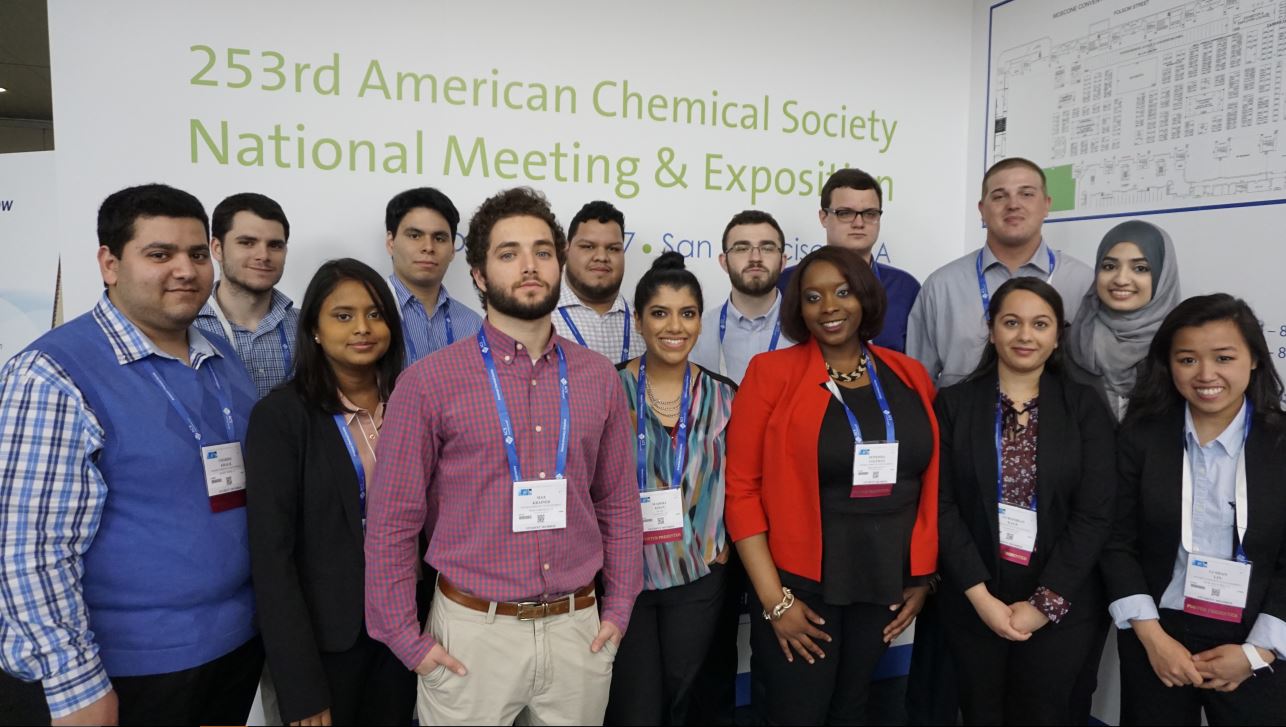
Thirteen Western Connecticut State University students who are candidates this year to receive Bachelor of Science degrees in chemistry or biochemistry presented their senior research projects at the recent 2017 American Chemical Society National Meeting and Exposition held in San Francisco.
The students, who have conducted research during the past year in the laboratories of Chemistry Department faculty mentors at WCSU, were accepted by the ACS to participate in the Chemical Education exhibition held during the annual meeting in April, which attracted approximately 18,000 chemistry professionals, academics and students from the United States and worldwide. In addition to presenting their research and viewing the work of fellow chemistry students in a professional conference setting, the ACS National Meeting afforded the opportunity for the WCSU participants to attend lectures on pioneering chemistry research investigations and attend workshops and career fairs useful in pursuing graduate studies and employment in the chemistry field.
Western students who presented their research at the ACS National Meeting include: Sumra Akhlaq, Sadia Alam, Freddy Balarezo, Gursimran Kaur, Madiha Khan, Trevor Lyons and Edwin Rojas, all of Danbury; Douglas Fleischmann, of Brookfield; Alexander Bieber and Li Shan Lin, both of New Milford; Charbel Khalil, of Sandy Hook; Robert Mownn, of Shelton; and Doneisha Coleman, of West Haven. WCSU student Maximilian Krainer, of New Fairfield, also attended the conference.
WCSU Associate Professor of Chemistry Dr. Nicholas J. Greco, who accompanied the students to San Francisco, observed that Western students have participated in the conference for the past three decades, but that this year’s delegation represented the largest and most diverse group of participants ever to represent the university at the ACS National Meeting. “They were able to interact with students and faculty from around the world, present and defend their research, critically analyze their work and learn what everyone else in the field is doing,” Greco said. “This experience provides validation that the research they are doing is important and relevant to the chemical community.”
“I’ve never seen so many people with similar research interests in the same place,” Fleischmann remarked about his experience in presenting at the conference. His research project, mentored by Assistant Professor of Chemistry Dr. Daniel Baluha, has involved using infrared spectroscopy to study the chemical composition of humic substances, the complex mixture of organic materials found in soil as well as in many aquatic environments. “I found five other individuals who are doing the same kind of research that I’m doing, only with different methodologies,” he said. “I learned how we’re all working to improve our understanding of chemistry, and we were able to communicate our research issues and find out how to improve our experiments.”
Beiber’s project, mentored by Professor of Chemistry Dr. Yuan Mei-Ratliff, has explored methods to achieve optimal performance of a type of resin used to determine the quantities of specific pharmaceuticals found in waste water. He described his experience at the ACS National Meeting as “eye-opening. It was really cool to walk into an exposition hall and see hundreds of companies, vendors and recruiters from the chemical industry, and so many poster presentations by students with the same interests as mine.”
Beiber, who transferred to Western from a larger college to pursue his chemistry degree, remarked that “it’s awesome how personal our professors have made our educational experience. We can approach every professor we have, and they make sure that we master what we need to know. I had a tough path to get here, and my professors have helped me every step of the way.”
At the May WCSU commencement, 21 students will receive bachelor’s degrees in either chemistry or biochemistry, and a total of 85 undergraduates currently are enrolled as chemistry or biochemistry majors. Greco said that the chemistry program at Western prepares students equally well for pursuit of studies for an advanced degree or for employment after graduation in industry, and this is reflected in the roughly even split between graduates who continue on to graduate school or enter the workplace. Among the students who attended the ACS conference, many plan to pursue graduate studies at institutions including Georgetown University, Tufts University, the SUNY College of Optometry, the University of Buffalo and the University of Connecticut.
Greco observed that WCSU chemistry students’ senior research projects are designed to provide one-on-one learning experiences with their faculty advisers, and customized to address each student’s specific area of interest in chemistry investigation. Kaur, Fleischmann and Bieber all remarked that their faculty advisers provided useful guidance when they began their projects, but also afforded wide latitude to design and pursue their own projects as they progressed.
“The majority of the time we spend in the classroom and the lab is to teach our students how to do research,” Greco said. “We are giving them the tools that will help them to go out and apply what they have learned when they leave Western.”
For information, contact the Office of University Relations at (203) 837-8486.